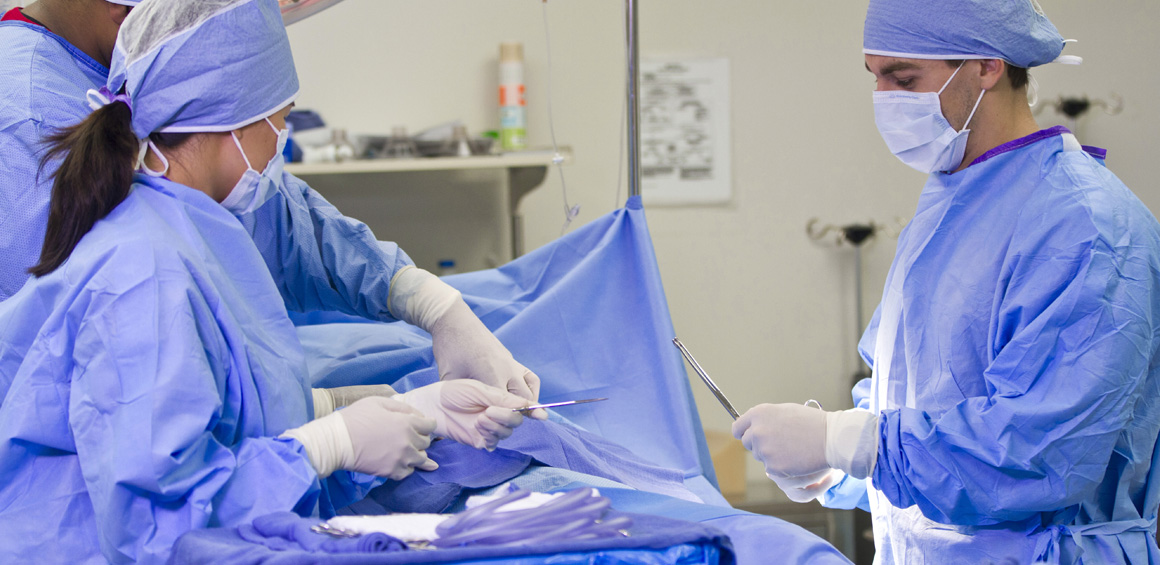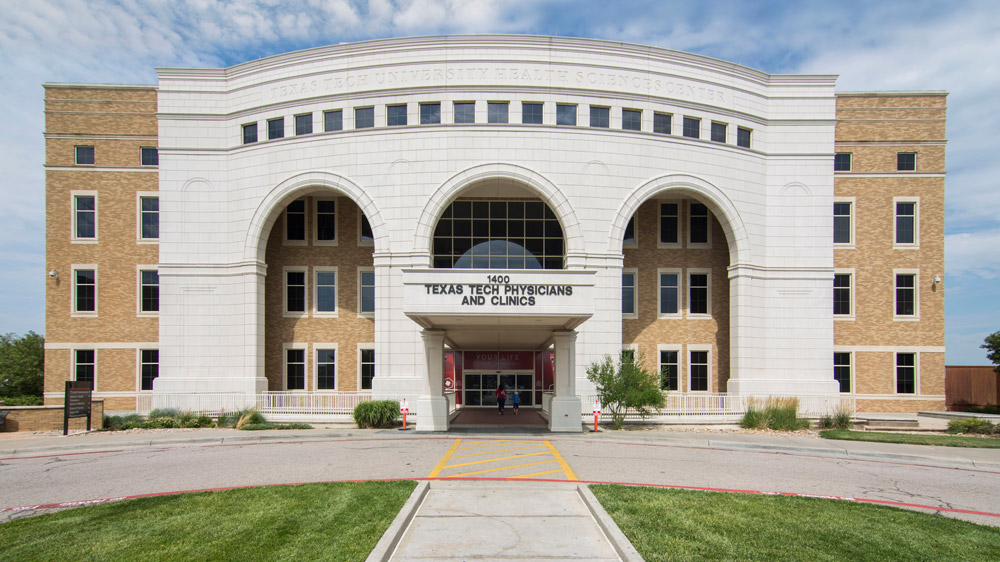
Minimally Invasive and General Surgery
Our experienced team of doctors at Texas Tech Physicians of Amarillo Surgery provides expert surgical care to the people of the Panhandle region.
Acid Reflux Disease (GERD) (Fundoplication)
Gastroesophageal reflux disease or GERD is a common digestive disease that occurs when stomach acid flows back into your esophagus and irritates the lining. GERD can result when your lower esophageal sphincter weakens and causes stomach contents to rise.
The most common signs and symptoms of GERD are frequent acid reflux and heartburn. Other symptoms include a dry cough, wheezing, asthma, pneumonia, nausea, vomiting.
Our surgeons offer advanced robotic and laparoscopic management of GERD through Nissen Fundoplication and other indicated procedures.
For more information on GERD visit MedlinePlus.
Bariatric Surgery
GASTRIC BYPASS
Gastric bypass is surgery that helps you lose weight by changing how your stomach and small intestine handle the food you eat. After the surgery, your stomach will be smaller. You will feel full with less food. The food you eat will no longer go into some parts of your stomach and small intestine that absorb food. Because of this, your body will not get all of the calories from the food you eat.
Our surgeons offer advanced robotic and laparoscopic weight loss surgery and revision of previous bariatric surgery.
For more information on Gastric Bypass or visit MedlinePlus.
VERTICAL SLEEVE GASTRECTOMY
Vertical sleeve gastrectomy is surgery to help with weight loss. The surgeon removes a large portion of your stomach.
The new, smaller stomach is about the size of a banana. It limits the amount of food you can eat by making you feel full after eating small amounts of food.
Our surgeons offer advanced robotic and laparoscopic weight loss surgery and revision of previous bariatric surgery.
For more information on Vertical Sleeve Gastrectomy visit MedlinePlus.
Colorectal Surgery
CONDITIONS AND PROCEDURES
- Colonoscopy
- Colorectal Cancer
- Hemorrhoid Surgery
- Perianal Disease
- Anal Fistula
- Diverticulitis
- Bowel Resection
- Crohn’s Disease
- Rectal Abscess
Bowel Resection
Small bowel resection is surgery to remove part or all of your small bowel. It is done when part of your small bowel is blocked or diseased.
The small bowel is also called the small intestine. Most digestion (breaking down
and absorbing nutrients) of the food you eat takes place in the small intestine.
Our surgeons offer advanced robotic and laparoscopic resection of Colon or small bowel
for all indications.
For more information on Bowel Resection visit MedlinePlus.
Foregut Surgery (GERD)
CONDITIONS AND PROCEDURES
- Acid Reflux/GERD
- Diaphragmatic Hernia Repair
- Esophagectomy
- Gastrectomy
- Hiatal Hernia Repair
- Magnetic Bead Augmentation
- Myotomy
- POEM (Per Oral Endoscopic Myotomy)
- Esophageal Stents
Gallbladder disease (Including Single Incision)
Gallbladder disease is very common, affecting about 10-15% of adults in Europe and the U.S. It is more common in women, Native Americans, Hispanics, the obese and people over the age of 40.
Some symptoms include: pain in the upper right side or middle of the abdomen, abdominal fullness, clay-colored stool, fever, nausea, and vomiting, or yellowing of skin and whites of eyes.
Our surgeons offer, we offer laparoscopic cholecystectomy and we also perform Single Site Robotic cholecystectomy for improved cosmesis and patient satisfaction.
For more information about Gallbladder Disease visit MedlinePlus.
Hernia (Hiatal, Inguinal, Incisional, Paraesophageal and Ventral)
A hernia is the protrusion of tissue or an organ (such as the intestine) through the wall of the cavity in which it is normally enclosed.
Weakness in the abdominal wall or an increased intra-abdominal pressure usually cause the hernia. This weakness can be congenital or acquired.
1 in 4 men and 1 in 50 women will require surgery from some type of hernia in their lifetime. 1 in 4 patients undergoing a laparotomy will require incisional hernia repair in their lifetime.
INGUINAL HERNIA REPAIR
This procedure is performed laparoscopic or open and is typically an outpatient procedure. Laparoscopic repair has smaller incisions, less pain, and allows patients to recover much quicker.
INCISIONAL HERNIA REPAIR
Incisional hernias are generally repaired with a laparoscopic procedure. The hernia defect is closed and the repair is reinforced using mesh. This can typically be done as an outpatient or with a short hospital stay. Most patients are back to normal activity within a few weeks.
COMPLEX HERNIA REPAIR
Large incisional hernias (greater than 8-10 cm) are best repaired with abdominal component separation. This repair is more than just closure of the defect but is an abdominal reconstruction that allows for return of abdominal muscles to their normal position. This allows for return of core strength and resolution of associated symptoms of the previous large hernia.
HERNIA SYMPTOMS
Pain mostly with lifting or straining
A bulge in the groin or abdomen
A burning or aching sensation at the site of the bulge
Weakness, pressure, or a feeling of heaviness in the abdomen
Nausea, vomiting, or constipation
Skin Cancer/Lesion Removal
CONDITIONS AND PROCEDURES
- Melanoma
- Skin Cancer
- Lipoma Removal
- Keloid Removal
- Cyst Removal
- Skin Masses
In addition to the above procedures we offer many additional advanced laparoscopic and robotic services for solid organ resection, feeding tube placement, treatment of achalasia, and other indications, often in conjunction with our surgical oncologists, acute care, and colorectal surgeons. If you have any questions, please call us directly: 806.414.9558.
Service Location
Texas Tech Physicians of Amarillo
Amarillo, TX 79106
Phone: 806.414.9558
